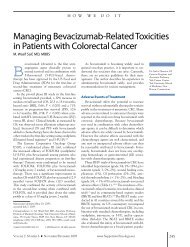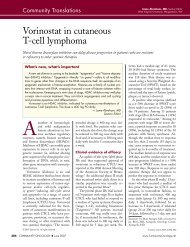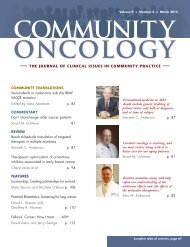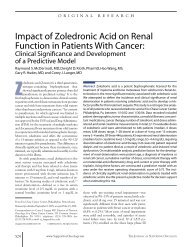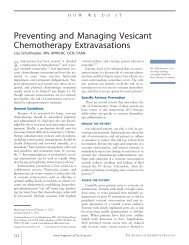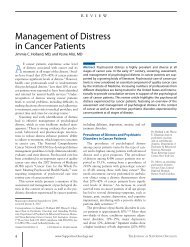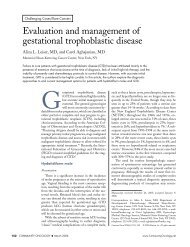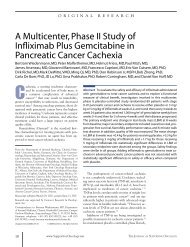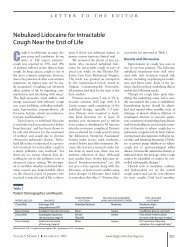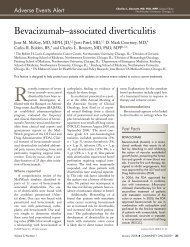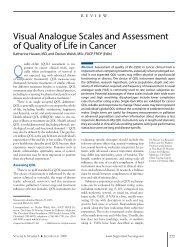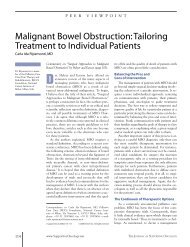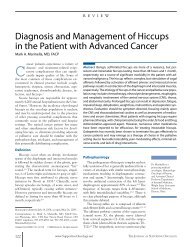Diagnosis and Management of Oral Mucositis
Diagnosis and Management of Oral Mucositis
Diagnosis and Management of Oral Mucositis
Create successful ePaper yourself
Turn your PDF publications into a flip-book with our unique Google optimized e-Paper software.
<strong>Diagnosis</strong> <strong>and</strong><br />
<strong>Management</strong> <strong>of</strong><br />
<strong>Oral</strong> <strong>Mucositis</strong><br />
Incidence <strong>of</strong> oral mucositis (%)<br />
100<br />
80<br />
60<br />
40<br />
20<br />
0<br />
Figure 3<br />
Grade 0<br />
Grade 1<br />
Grade 2<br />
Grade 3<br />
Grade 4<br />
Palifermin<br />
(n = 106)<br />
Grade 2<br />
Grade 0<br />
Grade 3<br />
Grade 4<br />
Placebo<br />
(n = 106)<br />
Effect <strong>of</strong> Palifermin on the Incidence<br />
<strong>and</strong> Severity <strong>of</strong> <strong>Oral</strong> <strong>Mucositis</strong><br />
Patients with hematologic cancers undergoing intensive<br />
chemotherapy <strong>and</strong> radiotherapy in conjunction with stemcell<br />
transplantation were treated with palifermin or placebo.<br />
Palifermin-treated patients had a lower incidence <strong>of</strong> grade 3/4<br />
oral mucositis than did those who received placebo (P < 0.001).<br />
Copyright © 2004 Massachusetts Medical Society.<br />
All rights reserved. 42<br />
therapy (CRT) may help to prevent the occurrence<br />
<strong>of</strong> oral mucositis. Shielding <strong>of</strong> normal tissues with<br />
mid-line mucosa-sparing blocks may minimize<br />
acute radiation-induced toxicity. 18,19 In patients<br />
with advanced head <strong>and</strong> neck cancer, careful control<br />
<strong>of</strong> the radiation dose <strong>and</strong> volume using threedimensional<br />
(3D) CRT has not compromised tumor<br />
control but has decreased toxicity compared<br />
with st<strong>and</strong>ard radiotherapy. 20 Similarly, high-dose<br />
rate intraoperative radiation therapy (IORT) allows<br />
delivery <strong>of</strong> radiation directly to the tumor bed<br />
<strong>and</strong> thus may minimize radiation exposure to normal<br />
tissues <strong>and</strong> may reduce toxicities such as oral<br />
mucositis. 21 However, at the site <strong>of</strong> implantation,<br />
there is an increased risk for mucositis.<br />
A meta-analysis <strong>of</strong> r<strong>and</strong>omized clinical trials <strong>of</strong><br />
interventions designed to prevent oral mucositis<br />
induced by radiotherapy <strong>and</strong>/or chemotherapy<br />
was recently performed. 22 A total <strong>of</strong> 45 studies<br />
involving 8 different therapies were evaluated.<br />
Only four interventions demonstrated some protective<br />
effect on the development or severity <strong>of</strong><br />
oral mucositis: PTA (polymyxin E, tobramycin,<br />
<strong>and</strong> amphotericin B), with an OR <strong>of</strong> 0.61, granulocyte-macrophage<br />
colony-stimulating factor<br />
(GM-CSF; OR, 0.53), oral cooling (OR, 0.3),<br />
<strong>and</strong> amifostine (Ethyol; OR, 0.37). Additional<br />
approaches are clearly needed for more effective<br />
prevention <strong>and</strong> therapy.<br />
TARGETED THERAPIES<br />
A number <strong>of</strong> targeted therapies have recently<br />
been evaluated for prevention <strong>and</strong>/or treatment <strong>of</strong><br />
oral mucositis, including amifostine <strong>and</strong> other antioxidants,<br />
growth factors, cytokines, <strong>and</strong> glutamine.<br />
Amifostine. Amifostine is a radioprotectant<br />
that has been widely studied for prevention <strong>of</strong> oral<br />
mucositis induced by chemotherapy or radiation<br />
therapy. This agent is believed to act as a free radical<br />
scavenger, protecting against ROS generated<br />
by exposure to radiation. 23 Amifostine has been<br />
approved in the United States for reducing the incidence<br />
<strong>of</strong> severe xerostomia in patients with head<br />
<strong>and</strong> neck cancer associated with radiation therapy<br />
but has not been approved for oral mucositis. It<br />
has also been shown to protect against mucositis<br />
induced by treatment with epirubicin <strong>and</strong> gemcitabine<br />
24 <strong>and</strong> to reduce the incidence <strong>of</strong> severe<br />
(grade 3/4) oral mucositis in patients treated with<br />
chemoradiotherapy for head <strong>and</strong> neck cancer. 25<br />
Investigators <strong>of</strong> a r<strong>and</strong>omized phase III trial 26 <strong>of</strong><br />
303 patients with previously untreated head <strong>and</strong><br />
neck cancer who received radiation therapy found<br />
that amifostine reduced the incidence <strong>of</strong> ≥ grade<br />
2 acute xerostomia but had no effect on mucositis.<br />
Additionally, a recent meta-analysis 27 <strong>of</strong> 1,451<br />
cancer patients who received radiation therapy<br />
with amifostine demonstrated a statistically significant<br />
reduction in the risk <strong>of</strong> mucositis (OR,<br />
0.37; 95% confidence interval [CI], 0.29–0.48; P<br />
< 0.00001). However, adverse effects associated<br />
with amifostine, such as nausea, vomiting, hypotension,<br />
<strong>and</strong> allergic reactions, are significant <strong>and</strong><br />
can limit its clinical utility.<br />
Other Antioxidants. Given the encouraging activity<br />
seen with amifostine, other compounds that<br />
can inhibit ROS have been evaluated for protection<br />
against oral mucositis. Benzydamine hydrochloride<br />
can inhibit the production <strong>of</strong> inflammatory cytokines<br />
<strong>and</strong> may thus reduce mucosal damage due<br />
to radiation. Topical application <strong>of</strong> the antioxidant<br />
N-acetylcysteine (NAC) was found to reduce the<br />
severity <strong>of</strong> oral mucositis in animal models. 28 Use<br />
<strong>of</strong> an oral rinse containing benzydamine hydrochloride<br />
decreased the incidence <strong>of</strong> oral mucositis in a<br />
r<strong>and</strong>omized, placebo-controlled trial 29 <strong>of</strong> patients<br />
with head <strong>and</strong> neck carcinoma who received radiation<br />
therapy. Benzydamine hydrochloride also<br />
delayed use <strong>of</strong> analgesics when compared with pla-<br />
18 www.SupportiveOncology.net THE JOURNAL OF SUPPORTIVE ONCOLOGY



